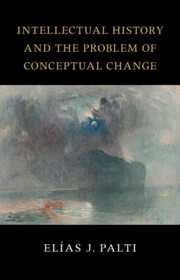Book contents
- Intellectual History and the Problem of Conceptual Change
- The Seeley Lectures
- Intellectual History and the Problem of Conceptual Change
- Copyright page
- Contents
- Preface
- Acknowledgments
- Introduction
- Chapter 1 Pocock, Skinner, and the “Historiographical Revolution”
- Chapter 2 The Republican Genealogy and the Normative Temptation
- Chapter 3 The Problem of Conceptual Change
- Chapter 4 Conceptual History
- Chapter 5 Koselleck’s Begriffsgeschichte
- Chapter 6 Hans Blumenberg and the Theory of Nonconceptuality
- Chapter 7 From Structuralism to Poststructuralism
- Chapter 8 Foucault’s Archaeology of Knowledge
- Chapter 9 The Archaeological Project and the Ignored Epistemic Mutation
- Chapter 10 Behind the Structures and the Subject
- Conclusion
- Epilogue
- Quoted Bibliography
- Index
Chapter 5 - Koselleck’s Begriffsgeschichte
Between Social and Conceptual History
Published online by Cambridge University Press: 02 May 2024
- Intellectual History and the Problem of Conceptual Change
- The Seeley Lectures
- Intellectual History and the Problem of Conceptual Change
- Copyright page
- Contents
- Preface
- Acknowledgments
- Introduction
- Chapter 1 Pocock, Skinner, and the “Historiographical Revolution”
- Chapter 2 The Republican Genealogy and the Normative Temptation
- Chapter 3 The Problem of Conceptual Change
- Chapter 4 Conceptual History
- Chapter 5 Koselleck’s Begriffsgeschichte
- Chapter 6 Hans Blumenberg and the Theory of Nonconceptuality
- Chapter 7 From Structuralism to Poststructuralism
- Chapter 8 Foucault’s Archaeology of Knowledge
- Chapter 9 The Archaeological Project and the Ignored Epistemic Mutation
- Chapter 10 Behind the Structures and the Subject
- Conclusion
- Epilogue
- Quoted Bibliography
- Index
Summary
Chapter 5 begins by analyzing the transition from Neo-Kantian Ideensgeschichte to Reinhart Koselleck’s Begriffsgeschichte. The latter intended to break the ahistorical assumptions behind the former tradition. It was closely associated to the postulate of the radical indefinability of concepts, given the contextual transposition they undergo. For Koselleck, the capacity of concepts to transcend their contexts of origin make of them to serve as the articulators of the structural connections in history. It permits conceptual history transcending social history. Yet, conversely, social history would transcend conceptual history because only the former could explain how structural connections eventually become broken. The postulate was at the basis of his polemic with Gadamer. However, as the chapter shows, Koselleck’s argument is founded on a fallacy. Lastly, the reintroduction of the opposition between “conceptual history” and “social history” breaks the tenets of his own historical-conceptual theory.
Keywords
- Type
- Chapter
- Information
- Intellectual History and the Problem of Conceptual Change , pp. 95 - 112Publisher: Cambridge University PressPrint publication year: 2024

